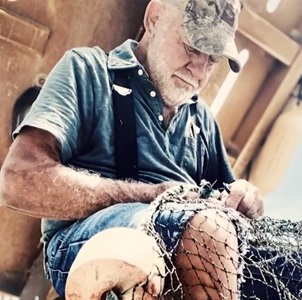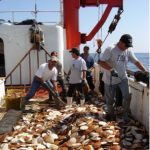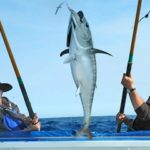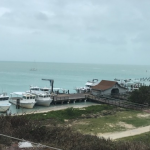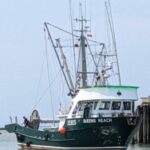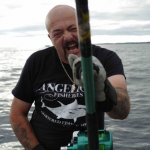Tag Archives: US shrimping industry
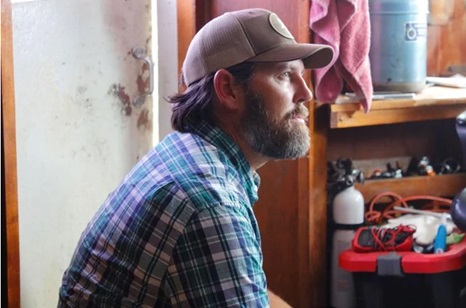
Wake Up Call Aboard The Pamela Sue
Carolina Seafood sits on Jeremy Creek, a creek named after King Jeremy, a Seewee Indian chief whose tribe lived along the creek’s banks. There I met Capt. Bryan Jones. He catches shrimp, no easy task. Besides the hard and dangerous work, he must overcome many a challenge. Capt. Jones showed me around his boat, Pamela Sue. Making our way through and past an assemblage of ropes, pulleys, nets, chains, and cables I filed a mental note. “Never bring a tripod onto a shrimp boat’s deck.” The chance of snagging something dangerous is great. Capt. Jones and I sat in the wheelhouse of his 1958 boat. As he discussed shrimping’s challenges, I looked around. I noticed bunk beds right away. Shrimpers sleep in their floating office, their home away from home. I saw too a small galley and a handsome wooden wheel caught my eye. And something else. An array of sophisticated electronics that navigate and portray bottom conditions and more. more, >>CLICK TO READ<< 10:33
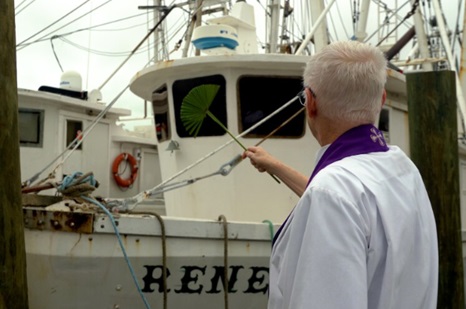
Annual blessing of the fleet helps after Hurricane Ian’s devastation
The blessing of the historic shrimping fleet is an annual tradition on Fort Myers Beach. After the devastation of Hurricane Ian, the shrimping fleet could use some blessings for even more hurdles ahead. Still, the Fort Myers Beach shrimping community was happy to have at least one day to celebrate. Photos, video, more, >>click to read<< 07:49
Shrimping: an endangered tradition
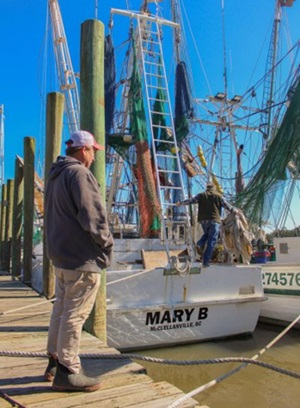 The salty ocean air, the smell of pluff mud, seafood restaurants line the streets, yet shrimp boats sit docked at the harbor. This is the scene pictured in the future by local shrimper and president of South Carolina’s Shrimpers Association, Rocky Magwood, as a result of imported shrimp. Shrimping has long been a tradition and staple of the local Charleston industry, with generations of shrimpers selling their product locally and beyond. A proud heritage and position for many shrimpers. However, as a result of increasingly high levels of imported shrimp, local shrimping jobs are at risk, according to Rocky Magwood. “The p rice of shrimp is terrible,” Magwood said. “Most shrimpers are broke right now.” photos, more, >>click to read<< 06:32
The salty ocean air, the smell of pluff mud, seafood restaurants line the streets, yet shrimp boats sit docked at the harbor. This is the scene pictured in the future by local shrimper and president of South Carolina’s Shrimpers Association, Rocky Magwood, as a result of imported shrimp. Shrimping has long been a tradition and staple of the local Charleston industry, with generations of shrimpers selling their product locally and beyond. A proud heritage and position for many shrimpers. However, as a result of increasingly high levels of imported shrimp, local shrimping jobs are at risk, according to Rocky Magwood. “The p rice of shrimp is terrible,” Magwood said. “Most shrimpers are broke right now.” photos, more, >>click to read<< 06:32
Southeast Texas shrimpers hope two new bills will help keep imported shrimp from taking away their jobs
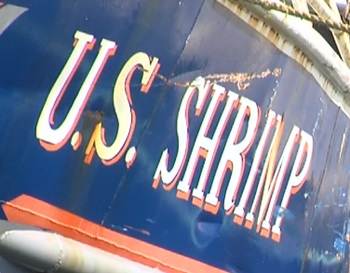 The Port Arthur Shrimper’s Association held an informational meeting Wednesday to help stop shrimp dumping. Shrimp dumping is the heavy importing of shrimp from other countries. Shrimpers in Southeast Texas are also pushing to impose stricter tariffs on imported shrimp. They say regulating the amount and quality of shrimp coming in could save their livelihoods. Two new federal bills could potentially benefit shrimpers and Southeast Texans. Local shrimpers say they aren’t making any money because U.S. businesses are buying imported shrimp at low prices. Video, more, >>click to read<< 09:47
The Port Arthur Shrimper’s Association held an informational meeting Wednesday to help stop shrimp dumping. Shrimp dumping is the heavy importing of shrimp from other countries. Shrimpers in Southeast Texas are also pushing to impose stricter tariffs on imported shrimp. They say regulating the amount and quality of shrimp coming in could save their livelihoods. Two new federal bills could potentially benefit shrimpers and Southeast Texans. Local shrimpers say they aren’t making any money because U.S. businesses are buying imported shrimp at low prices. Video, more, >>click to read<< 09:47
Recreational, commercial shrimp season closes in state waters
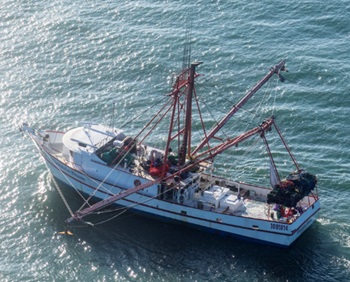 Georgia’s commercial and recreational food shrimp season closed on Thursday, Jan. 18, and will open again in May. This season saw 184 licensed shrimp trawlers in Georgia’s water, 117 of which were Georgia residents. On average, these shrimpers harvested 16.788 pounds of shrimp tails per hour spent trawling, the highest catch per unit effort on record. The closure affects Georgia’s territorial waters three nautical miles out to sea. This year’s is the highest CPUE CRD has recorded. Diesel fuel prices continue to challenge Georgia’s shrimping industry, with the national average price of No. 2 diesel fuel sitting at $4.214, according to the U.S. Energy Information Administration. more, >>lick to read<< 19:20
Georgia’s commercial and recreational food shrimp season closed on Thursday, Jan. 18, and will open again in May. This season saw 184 licensed shrimp trawlers in Georgia’s water, 117 of which were Georgia residents. On average, these shrimpers harvested 16.788 pounds of shrimp tails per hour spent trawling, the highest catch per unit effort on record. The closure affects Georgia’s territorial waters three nautical miles out to sea. This year’s is the highest CPUE CRD has recorded. Diesel fuel prices continue to challenge Georgia’s shrimping industry, with the national average price of No. 2 diesel fuel sitting at $4.214, according to the U.S. Energy Information Administration. more, >>lick to read<< 19:20
Galveston shrimpers being run out of business due to low prices, overseas imports
Texas Gulf shrimpers are going out of business during what many are calling the worst period in the history of the industry. “You’ll see numerous boats up and down this dock and most of them are just set here,” Nikki Johnson-Kunz said as she stood along Pier 19 in Galveston. Pier 19 was once a bustling hub for Galveston’s shrimping fleet — from the same spot a few years ago, one could watch dozens of shrimp boats running back and forth to the Gulf and then to the seafood markets along the docks to sell their catch. Johnson-Kunz married into a Galveston family that’s been fishing the waters for shrimp for more than a century. They said business has never been as bad as it is now. “Our prices that we get paid per pound are under a dollar,” she said. “It’s sickening.” Video, >>click to read<< 10:52
Save US shrimping industry. Buy domestic wild-caught shrimp.
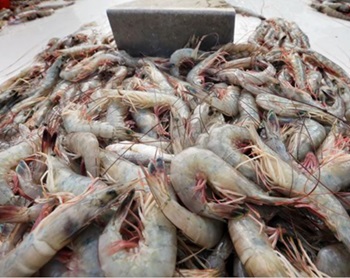 For decades, South Carolina’s shrimpers have faced challenges, but the imported shrimp crisis has reached a critical juncture. The influx of foreign shrimp, often at artificially low prices, is decimating our domestic shrimping industry, putting the livelihoods of thousands of South Carolina families at risk. The situation has changed dramatically in recent years. The rising tide of imported shrimp far outpaces shrimp consumption in the United States because of subsidized foreign production and lax trade enforcement. American shrimpers aren’t competing on a level playing field. We face an inflection point. If we do not take decisive action, the domestic shrimping industry will collapse, with devastating consequences for our coastal communities and the heritage of shrimping in South Carolina. >>click to read<< 09:06
For decades, South Carolina’s shrimpers have faced challenges, but the imported shrimp crisis has reached a critical juncture. The influx of foreign shrimp, often at artificially low prices, is decimating our domestic shrimping industry, putting the livelihoods of thousands of South Carolina families at risk. The situation has changed dramatically in recent years. The rising tide of imported shrimp far outpaces shrimp consumption in the United States because of subsidized foreign production and lax trade enforcement. American shrimpers aren’t competing on a level playing field. We face an inflection point. If we do not take decisive action, the domestic shrimping industry will collapse, with devastating consequences for our coastal communities and the heritage of shrimping in South Carolina. >>click to read<< 09:06







